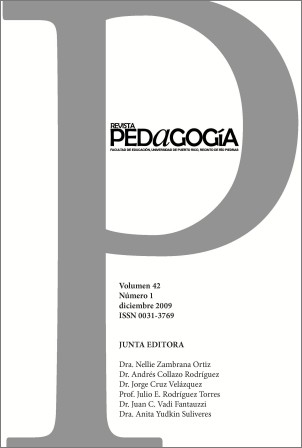Abstract
Since Plato a metaphor has dominated western thought. This metaphor depicts reason as possessing a 'mental eye‘ that apprehends truths in the same way in which our perceptual vision reflects and reproduces things. The visual metaphor is accompanied by an objectivist doctrine in which humans beings grasp knowledge, instead of constructing it. The problem emerges when we forget that it is only a metaphor and begins to believe that it is an accurate description of how we learn. This ocular metaphor has reinforced a passive view of learning which is responsible for the way in which we have designed education as a process of reproduction. Why was vision, and not some other perceptual sense, employed? It is argued that vision contains some elements which are not found in the other senses. To conclude, the possibility of portraying learning by non representative means is examined.
How to cite:
Suárez-Silverio, E. J. (2011). La metáfora ocular y representativa del pensamiento y la educación. Pedagogía, 42(1), 79-102. Retrieved from https://revistas.upr.edu/index.php/educacion/article/view/16618
References
Aristotle. (1941). The basic works of Aristotle (R. McKeon, Ed.). New York: Random House.
Barzun, J. (2000). From dawn to decadence: 1500 to the present. New York: Harper Collins Publishers.
Dewey, J. (1952). La busca de la certeza: una relación entre el conocimiento y la acción (E. Ímaz, Trad.). México: Fondo de Cultura Económica. (Trabajo original publicado en 1929).
Dewey, J. (1960). The need for a recovery of philosophy. En R. J. Bernstein (Ed.), On experience, nature, and freedom (pp. 19-69). Indianapolis: The Bobbs-Merrill Company.
Dewey, J. (2000a). La influencia del darwinismo en la filosofía. En Á. M. Faerna (Ed. y Trad.), La miseria de la epistemología: Ensayos de pragmatismo (pp. 49-60). Madrid: Editorial Biblioteca Nueva.
Dewey, J. (2000b). El carácter práctico de la realidad. En Á. M. Faerna (Ed. y Trad.), La miseria de la epistemología: ensayos de pragmatismo (pp. 157- 174). Madrid: Editorial Biblioteca Nueva.
Hostos, E. M. (2000). Obras completas (edición crítica): Tratado de moral. Vol. IX, Tomo I. Río Piedras, PR: Editorial de la Universidad de Puerto Rico.
Jonas, H. (1966). The phenomenon of life: Toward a philosophical biology. Chicago: The University of Chicago Press.
Platón. (1941). La república o el estado. Madrid: Espasa-Calpe, S.A.
Romero, F. (1954). Ubicación del hombre. Buenos Aires: Editorial Columba.
Rorty, R. (1991). Contingencia, ironía y solidaridad (A. E. Sinnot, Trad.). Barcelona: Paidós. (Trabajo original publicado en 1989).
Rorty, R. (2001). La filosofía y el espejo de la naturaleza (J. Fernández Zulaica, Trad.). Madrid: Ediciones Cátedra. (Trabajo original publicado en 1979).
Ryle, G. (2005). El concepto de lo mental (E. Rabossi, Trad.). Barcelona: Editorial Paidós Ibérica. (Trabajo original publicado en 1949).
Trachtenberg, A. (2008). Through a glass, darkly: Photography and cultural memory. Social Research, 75(1), 111-132.
Wittgenstein, L. (1958). Philosophical investigations (G. E. M. Anscombe,Trad.). New York: Mac Millan.
The contents published in the Puerto Rico Journal of Education is freely distributed under open access practices, in accordance with the Creative Commons license, Attribution-NonCommercial 4.0 International (CC BY-NC 4.0). Through these principles, the journal and its authors allow readers to access, reproduce and share articles in full text. Users should give credit to authors in a reasonable way without suggesting they have their support. Under no circumstances, readers may make use of the contents for commercial purposes. The authors retain copyright on their works.

